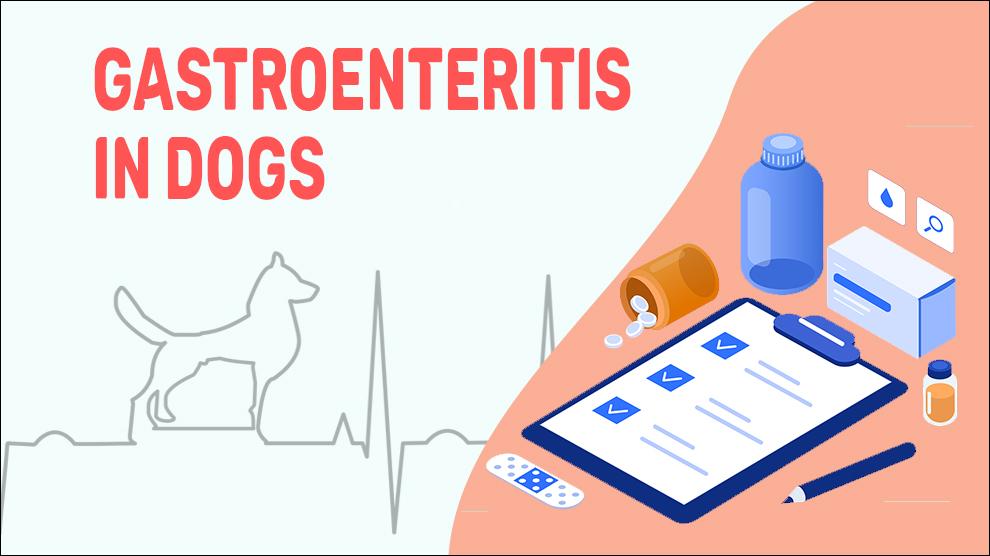What Is Gastroenteritis In Dogs?
Gastroenteritis is a common digestive problem in dogs that affects the gastrointestinal tract.
This condition is caused by inflammation of the stomach and intestines, which can result in a variety of symptoms, including diarrhea, abdominal pain, and vomiting.
Gastroenteritis can be caused by various factors, including bacterial infections, viral infections, dietary indiscretion, and parasitic infestations.
In severe cases, gastroenteritis can lead to dehydration, electrolyte imbalances, and even death.
Symptoms Of Gastroenteritis In Dogs
The symptoms of gastroenteritis in dogs can vary depending on the severity of the condition.
Some of the common symptoms include:
- Diarrhea: This is the most common symptom of gastroenteritis in dogs. The stool may be loose, watery, or contain mucus or blood.
- Vomiting: Dogs may vomit due to the inflammation of the stomach and intestines. The vomit may contain food, bile, or foam.
- Abdominal pain: Dogs may show signs of discomfort, such as whining or panting, due to abdominal pain.
- Loss of appetite: Dogs with gastroenteritis may lose their appetite and refuse to eat.
- Lethargy: Dogs may seem weak or lethargic due to dehydration or electrolyte imbalances.
- Dehydration: Dogs with gastroenteritis may become dehydrated due to diarrhea and vomiting. Signs of dehydration include dry gums, sunken eyes, and lethargy.
Treatment Options For Gastroenteritis In Dogs
The treatment of gastroenteritis in dogs depends on the underlying cause and the severity of the symptoms. In mild cases, the symptoms may resolve on their own without any medical intervention.
However, in severe cases, veterinary care is necessary to manage the symptoms and prevent complications.
- Fluid therapy: Dogs with gastroenteritis may become dehydrated due to diarrhea and vomiting. Fluid therapy is necessary to maintain hydration and electrolyte balance.
- Medications: Anti-inflammatory medications may be prescribed to reduce inflammation and relieve pain. Antibiotics may be necessary to treat bacterial infections.
- Diet: A bland diet may be recommended for dogs with gastroenteritis to reduce the workload on the digestive system. This diet may include boiled chicken and rice or a prescription diet.
- Probiotics: Probiotics may be prescribed to restore the balance of good bacteria in the gut.
Home Remedies For Gastroenteritis In Dogs
In addition to veterinary care, there are several home remedies that can help manage the symptoms of gastroenteritis in dogs:
- Fasting: Fasting for 12-24 hours can help give the digestive system a break and reduce inflammation. However, it is important to consult with a veterinarian before initiating a fast.
- Small, frequent meals: Once the dog has fasted, small, frequent meals of a bland diet can help provide nutrition without overloading the digestive system.
- Probiotics: Probiotic supplements can help restore the balance of good bacteria in the gut.
- Water: Offer plenty of water to prevent dehydration.
- Ginger: Ginger has anti-inflammatory properties and can help relieve nausea and vomiting.
It is important to consult with a veterinarian before administering any home remedies to ensure that they are safe and effective for the individual dog.
How To Prevent Gastroenteritis In Dogs?
Prevention is key to avoiding gastroenteritis in dogs.
Here are some tips to help prevent the condition:
- Proper Nutrition: Feeding a healthy, balanced diet is essential for preventing gastroenteritis. Choose a high-quality dog food that contains all the essential nutrients your dog needs.
- Hydration: Make sure your dog has access to clean, fresh water at all times to prevent dehydration.
- Proper Hygiene: Keep your dog's living space clean and free of feces to prevent the spread of harmful bacteria and viruses.
- Regular Vet Check-ups: Regular check-ups with your veterinarian can help detect and treat any potential health problems before they develop into more serious conditions.
Affected Dog Breeds Of Gastroenteritis
Gastroenteritis can affect any breed of dog, Some dog breeds are more susceptible to gastroenteritis than others, including the Boxer, German Shepherd, Labrador Retriever, Standard Poodle, Rottweilers, and Bulldogs.
Causes For Gastroenteritis In Dogs
Causes:
Gastroenteritis in dogs can be caused by various factors, including:
- Bacterial infections: Bacteria such as Salmonella and E. coli can cause gastroenteritis in dogs. These bacteria are typically found in contaminated food or water.
- Viral infections: Viruses such as parvovirus and coronavirus can cause gastroenteritis in dogs. These viruses are highly contagious and can be transmitted through contact with infected animals or feces.
- Dietary indiscretion: Dogs that eat spoiled food, garbage, or non-food items can develop gastroenteritis.
- Parasitic infestations: Parasites such as roundworms, hookworms, and giardia can cause gastroenteritis in dogs.
When To See A Vet For Gastroenteritis In Dogs?
If you notice any symptoms of gastroenteritis in your dog, it is important to seek veterinary care immediately. Your veterinarian can perform a physical examination and recommend appropriate treatment, which may include fluid therapy, antibiotics, and dietary changes.
Food Suggestions For Gastroenteritis In Dogs
When it comes to feeding your dog with gastroenteritis, it is important to offer a bland, easily digestible diet. Boiled chicken and rice, low-fat cottage cheese, and plain yogurt are all good options.
Avoid feeding your dog fatty, greasy, or spicy foods, as these can further irritate the stomach and cause additional problems.
Conclusion
Gastroenteritis is a common condition in dogs that can be caused by a variety of factors. It is important to seek veterinary care if a dog is experiencing symptoms of gastroenteritis, as prompt treatment can help avoid further complications.
In addition to traditional veterinary treatments, there are also some home remedies that can help manage the symptoms of gastroenteritis in dogs.
By taking steps to prevent gastroenteritis, such as feeding the dog a high-quality diet and providing clean water, dog owners can help reduce the risk of infection and ensure the overall health and well-being of their furry friends.

















